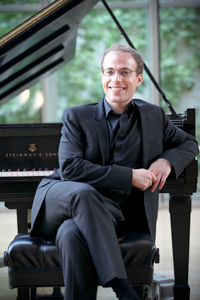by James Flood

Apparently to lighten the evening, the program itself was downsized a little from the Orchestra’s typical offering, placing Beethoven’s modestly-sized 4th Symphony between the four-minute “Overture to the Creatures of Prometheus” and the 20-minute “Choral Fantasy” and excluding an intermission.
The opening overture boasted crisp, clean and energized 16th notes in the strings, generating a quick burst of excitement that was the perfect start for a summer evening at Severance Hall.
If there is one Beethoven Symphony that could be named his most forgotten it would likely be Symphony No. 4. Upon hearing it, one wonders why. While the work doesn’t contain the full-scale drama and grandness of, say the third, fifth or ninth, it delivers the memorable themes one expects from a Beethoven symphony, includes a lovely second movement Adagio, and maintains a joyful energy throughout.
Acknowledging the importance of high contrast in Beethoven’s orchestral writing, Ling conducted with the authority and severity of a drill sergeant during the punctuated forte measures, but in the softer legato passages he instantly transformed his manner into that of a gentle and benevolent father.
The first movement’s dark Adagio opening was supremely unified in its long tones and built nicely to the surprise of the opening theme with its unapologetic enthusiasm. The quiet development section was subdued yet energized, and its gradual, unfolding crescendo leading to the explosive recap was particularly effective. The second movement Adagio featured some delicate and lovely work by the violins and a beautifully controlled, soft clarinet solo.
Pianist Orion Weiss was brilliant in the Fantasia in C minor or “Choral Fantasy.” He played the cadenza-like opening solo with the sense of drama, flexibility and spontaneity that captured Beethoven’s improvisatory style. His many extended trills were light and shimmering, and his sense of ensemble with the orchestra was strong.
The small groups of instruments that played successive variations on the theme were all delightful, though a personal favorite was the clarinets and bassoon.
The trio of two tenors and bass sang with wonderful, clear projection and were in perfect sync with one another. The trio of two sopranos and alto had some nice moments but there were some tuning issues. The difficult jump of a major 7th was a bit under pitch both in the solo soprano part and later in the soprano section.
Otherwise, the chorus was powerful in its somewhat brief appearance. On the words “und kraft” (and strength) the chorus twice went from a forte to a sudden fortississimo. This unusual dynamic was extremely well managed, producing a glorious effect. Kudos to chorus master Robert Porco for making sure that moment was done perfectly.
Published on ClevelandClassical.com August 19, 2014.
Click here for a printable copy of this article.



